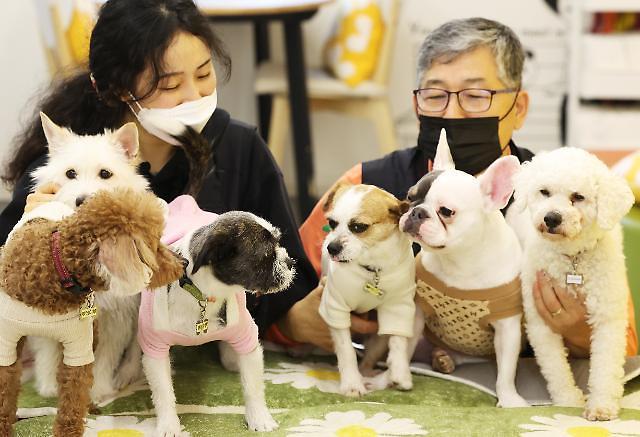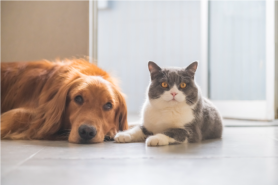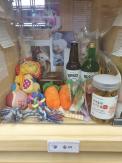
[Yonhap Photo]
The country's pet market that stood at 3.4 trillion won in 2020 saw a rapid expansion during the last few years, mainly due to the COVID-19 pandemic that left up to 70 percent of office workers working remotely at home to prevent the spread of the infectious virus. According to data released by the Korea Agency for Education, Promotion & Information Service in Food, Agriculture, Forestry & Fisheries (EPIS), the online search rate for the keyword "pet" increased by 27 percent in 2020, compared to a year ago.
Keywords for pet-related services search as pet hotels, pet hospitals, and pet funeral centers were also popular on online search portals. Because the majority of pet owners live as single households, new jobs such as "pet-sitter" and "pet insurance planner" also began to receive attention. According to a big data research center operated by South Korea's major credit card service operator Shinhan Card, an ordinary pet owner spends about 355,000 won per pet every year.
Yuhan, a pharmaceutical and chemical company in South Korea, became the early starter in South Korea's pet healthcare market by forging partnerships with SB Bio Pharm, an animal medicine company, and NeoDin BioVet, an animal health diagnostic service company, in 2021 by investing seven billion won and 6.5 billion won respectably. Yuhan also partnered with GNT Pharma, a domestic canine cognitive disorder medicine maker, to release GedaCure, a medicine for dogs with cognitive dysfunction syndrome, in 2021.
Daewoong Pharmaceutical, a major pharmaceutical company in South Korea, is currently developing Envlo, a tablet medicine for type-2 diabetes, for dogs. Currently, dogs with diabetes are treated with insulin injections but it is hard for dog owners to apply medication because the animals fear needles. Daewoong Pharmaceuticals has Daewoong Pet, the pet healthcare wing, which focuses on health supplements such as multi-vitamin pills and probiotics tablets for dogs.
The rate of big pharmaceutical players joining the race to become the top player in the pet market is predicted to accelerate even more as the regulation evaluation committee of the Office for Government Policy Coordination suggested related administrative bodies on March 30 to revise the regulation that limits the production of animal drugs in the same facility that also makes human drugs. When the regulations are lifted, current drug makers can also produce animal drugs using their existing facilities without having to build new factories.
When the regulations regarding the production of pet drugs and health supplements are lifted, small-and-medium-sized enterprises (SMEs) are also predicted to make a foray into the pet healthcare market. Pharmaceutical companies like Samil Pharmaceutical and Samjin Pharmaceutical have decided to start the development of animal drugs through recent investor meetings.
Copyright ⓒ Aju Press All rights reserved.




